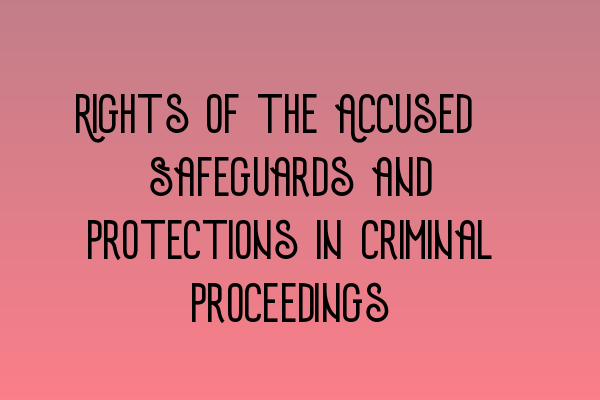Rights of the Accused: Safeguards and Protections in Criminal Proceedings
In the criminal justice system, every individual accused of a crime has certain fundamental rights and protections. These safeguards are designed to ensure fair and equitable treatment throughout the entire criminal proceedings. In this article, we will explore some of the key rights of the accused and their importance in upholding the principles of justice.
Presumption of Innocence
One of the most fundamental principles in criminal law is the presumption of innocence. This means that every person accused of a crime is presumed innocent until proven guilty beyond a reasonable doubt. The burden of proof lies with the prosecution, and the accused is not required to prove their innocence. This principle protects individuals from being unjustly convicted.
It is essential to understand the significance of this presumption of innocence during criminal proceedings. As a solicitor, it is your duty to ensure that your client’s rights are protected, and they are seen as innocent until proven guilty.
Right to Legal Representation
Every accused person has the right to legal representation. This means that they have the right to consult with a solicitor and be represented by legal counsel throughout the entire criminal process. The right to legal representation ensures that the accused receives a fair trial and can effectively present their case.
As a solicitor, it is crucial to provide competent and dedicated legal representation to your clients. By ensuring that they have access to legal advice and representation, you help safeguard their rights in criminal proceedings.
Right to a Fair Trial
The right to a fair trial is a vital safeguard for the accused. It includes various elements such as the right to be heard, the right to a public trial, the right to confront witnesses, and the right to present evidence. A fair trial ensures that the accused has an opportunity to defend themselves and challenge the prosecution’s case.
As a solicitor, it is your role to ensure that your client’s right to a fair trial is protected. This involves conducting a thorough investigation, challenging evidence, cross-examining witnesses effectively, and presenting a strong defense.
Protection Against Self-Incrimination
The right against self-incrimination is a crucial safeguard for the accused. This means that the accused cannot be forced to testify against themselves or provide self-incriminating evidence. The right to remain silent is a fundamental principle in criminal law and protects individuals from being compelled to admit guilt.
As a solicitor, it is essential to advise your clients about their right to remain silent and protect them from making statements that could potentially incriminate them. By exercising this right, your clients can avoid self-incrimination and preserve their defense strategy.
Conclusion
The rights and protections afforded to the accused in criminal proceedings are essential for upholding justice. These safeguards, such as the presumption of innocence, the right to legal representation, the right to a fair trial, and the protection against self-incrimination, ensure that individuals are treated fairly and their rights are upheld.
At SQE Criminal Law & Practice Law UK, we understand the importance of these rights and strive to provide exceptional legal representation to our clients. If you are preparing for the SQE 1 or SQE 2 exams, we offer preparation courses and practice materials to help you succeed. Check out our related articles:
- SQE 1 Practice Exam Questions
- SQE 1 Practice Mocks FLK1 FLK2
- SQE 2 Preparation Courses
- SQE 1 Preparation Courses
- SRA SQE Exam Dates
By understanding and advocating for the rights of the accused, we contribute to a fair and equitable criminal justice system. If you require legal representation or assistance, please reach out to SQE Criminal Law & Practice Law UK today.
